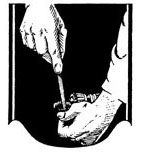
The Perils of Ecumenical Straight-Talk
IN THE SERVICE OF TRUTH
The attempt to describe to a conservative Protestant the differences between the Catholic Church and his tradition usually ends in one of two ways: He will be your good friend or your enemy. He can become your enemy even when he has asked you to explain the differences, and even when you’re careful to ring your description with declarations of the respect and admiration you feel for conservative Protestants. In only a few cases, in my experience, will he respond neutrally, in a way that leaves your relationship unchanged. It’s not easy to predict who will react which way. I’ve found that in almost as many cases the polemicist will remain friendly and the nice guy will get angry. The relation improves in about four cases out of ten, and declines in six, though some people may be better at these discussions than I am and make friends with a higher percentage of the people with whom they talk. What one might call the apostolate of ecumenical clarification is a risky enterprise.
Once in a while, a Protestant will even try to convince you that you don’t understand Catholicism, that it’s either laxer or more rigid than you suppose. A friend, an Episcopal theologian, once explained to me that Joseph Ratzinger believed that Anglicanism was a church just like the Catholic Church. He had badly misread some of the cardinal’s books. I tried to explain, pointing him to Dominus Iesus and other sources, and he told me I was imposing my own fundamentalism upon the liberal-minded Ratzinger.
To be clear, I’m speaking of explanation, not polemics or evangelization. Over the years since I entered the Catholic Church, I have felt, because of my personal history and my continuing friendships with conservative Protestants, a calling to explain each side to the other, making clear who believes what, how they agree, and how they differ. Friendships are easier and ecumenical relations advance when both sides say what they mean and look honestly not only at their agreements but at their differences. We know Christians are divided. We ought to know with some precision how they’re divided and why.
Many Christians like to say, “The things that bind us are greater than the things that divide us,” which, though generally true, doesn’t help when one Christian has to say to another, “You can’t receive communion here,” or “Even though you were baptized as an infant, you have to be baptized again.” It doesn’t help when conservative Christians have an agreeable discussion about the problem of homosexual “marriage” and the talk turns to the nature of marriage itself and the intrinsic need to be open to life. Piping up with “The things that bind us are greater than the things that divide us” does not keep the room from chilling when one side in effect says to the other, “Your wife shouldn’t be on the Pill,” or, from the other side, “You should be more careful not to have more children.”
You May Also Enjoy
The desire for Christian unity can assume such importance that insistence on points of doctrine comes to be regarded as inconvenient or divisive.
The apostolate of ecumenical clarification requires a willingness to see friends make themselves into enemies.
The robust friendship of 20th-century Swiss theologians Karl Barth and Hans Urs von Balthasar offers a different approach to ecumenical dialogue.

